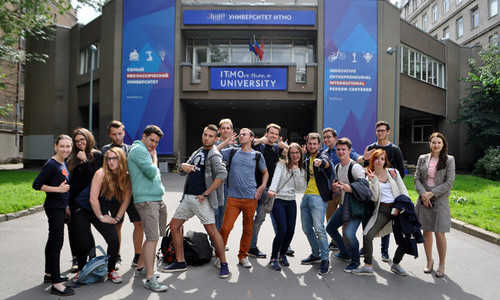Scientists at the National Research Nuclear University MEPhI in Moscow.
Russian universities have created all sorts of new academic programs, short-term courses and postgraduate opportunities in an effort to attract more foreign students.
In an address to the Federal Assembly on March 1, Russian President Vladimir Putin emphasized that Russia is eager to attract talented students from abroad by creating favorable conditions and more opportunities for education and subsequent employment in the country.
“The main focus should be on those that our country needs: young, healthy and well-educated people. For them we need to make the system of acquiring Russian citizenship easier,” Putin said. (link in Russian)
But how are the country’s universities implementing this policy in practice? And what new opportunities have appeared in Russian higher education this year?
From medical cybernetics to biodiversity
Russian universities have almost outdone themselves this year in terms of the variety of courses offered to foreign students. Apart from the many existing programs in English, new courses will available in:
- Medical biophysics, medical biochemistry and medical cybernetics (Lobachevsky State University of Nizhny Novgorod)
-Modern problems of software engineering (master’s program in English at the National Research Nuclear University MEPhI in Moscow)
-Technological leadership and entrepreneurship (master’s in English at Peter the Great St. Petersburg Polytechnic University or SPbPU)
-Digital management in modern equipment, molecular robotics and biosensor systems, bioinformatics and systemic biology, intellectual technologies in robotics (ITMO University in St. Petersburg)
-Mechanical Engineering (in English at South Ural State University in Chelyabinsk)
-Elite technical education (Tomsk Polytechnic University)
-And even a degree focused on biodiversity (master’s program in English at Tomsk State University) with subsequent fieldwork dealing with environmental protection of the Arctic!
Summer and winter schools
Those considering Russia as a summer vacation destination have the opportunity to take part in many summer intensive schools. For example, Lobachevsky University now offers an international intensive summer school program in Russian language and culture, while other universities, such as MEPhI and the Saint Petersburg Electrotechnical University "LETI" target future IT professionals with summer courses in information technologies and cybersecurity. Those interested in fields such as energy or biomedical engineering can also apply for SPbPU’s international summer and winter schools.
Opportunities for postgrads
This year ITMO University in St. Petersburg launched a new program for young scientists (30-35 years old) who have received their Ph.D. within the past five years. ITMO invites them to join the university, carry out research work and lead student seminars at the same time.
Meanwhile, University of Tyumen has launched a competition for foreign candidates who want to complete a Ph.D. in Russia. The university is ready to fund the winners of the competition called “Talent++” with a monthly scholarship of 30,000 rubles ($533). (link in Russian)
At the same time, Russian universities continue to form collaboration agreements with foreign universities to create double and even triple degree programs. Lobachevsky University recently joined a new Erasmus Mundus international master’s program called “Central & East European, Russian & Eurasian Studies”. The program allows students to study at three different universities: University of Tartu, University of Glasgow plus one of other six partner universities (including Lobachevsky) and to receive three different degrees upon completion of the program.
Meanwhile, Samara University continues to collaborate with European universities in various international programs that have been launched in recent years. In cooperation with the University of Stuttgart (Germany) and the University of Turin (Italy), it prepares professionals to work on power systems of flying machines. There is also a program on mechatronic systems in conjunction with Lappeenranta University of Technology (Finland).
Want to study in Russia but not sure which program to choose? No worries! A new project called Russia.Study is there to help!


